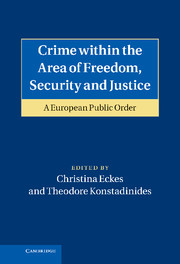Book contents
- Frontmatter
- Contents
- Contributors
- Acknowledgements
- ABBREVIATIONS
- Introduction
- 1 EU criminal justice: beyond Lisbon
- 2 The European Union policy against corruption in the light of international developments
- 3 The EU's anti-money laundering agenda: Built on risks?
- 4 EU anti-money laundering regulation: Multilevel cooperation of public and private actors
- 5 The legal framework of the European Union's counter-terrorist policies: full of good intentions?
- 6 Organised crime: developments and challenges for an enlarged European Union
- 7 The Europeanisation of extradition: how many light years away to mutual confidence?
- 8 The European Evidence Warrant: Mutual Recognition and Mutual (Dis)Trust?
- 9 Law and order and internal security provisions in the Area of Freedom, Security and Justice: before and after Lisbon
- 10 The external dimension of the EU's Area of Freedom, Security and Justice
- Index
- References
2 - The European Union policy against corruption in the light of international developments
Published online by Cambridge University Press: 01 June 2011
- Frontmatter
- Contents
- Contributors
- Acknowledgements
- ABBREVIATIONS
- Introduction
- 1 EU criminal justice: beyond Lisbon
- 2 The European Union policy against corruption in the light of international developments
- 3 The EU's anti-money laundering agenda: Built on risks?
- 4 EU anti-money laundering regulation: Multilevel cooperation of public and private actors
- 5 The legal framework of the European Union's counter-terrorist policies: full of good intentions?
- 6 Organised crime: developments and challenges for an enlarged European Union
- 7 The Europeanisation of extradition: how many light years away to mutual confidence?
- 8 The European Evidence Warrant: Mutual Recognition and Mutual (Dis)Trust?
- 9 Law and order and internal security provisions in the Area of Freedom, Security and Justice: before and after Lisbon
- 10 The external dimension of the EU's Area of Freedom, Security and Justice
- Index
- References
Summary
INTRODUCTION
Since the 1990s, when the negative consequences of corruption on social, political and economic systems came to be widely recognised, combating corruption has become an important international policy problem. In 1998, Brademas and Heimann wrote that ‘after years of being tolerated with a mixture of apathy, cynicism, and denial, corruption is becoming a target of serious international action.’ The prevention and combating of corruption ceased to be a purely domestic policy matter and countries agreed to regulate some aspects of the fight against corruption at the international level.
International cooperation has become particularly urgent in cases of cross-border corruption. Globalisation opened up new frontiers not only for trade and business, but also for corrupt practices. Differences in laws and procedures across countries rendered the prosecution of cross-border corruption difficult for national authorities. The countries were, therefore, compelled to agree upon certain rules facilitating investigation and prosecution to ensure that cross-border corruption was dealt with more efficiently. As a result, the first international initiatives focused on the approximation of offences for the purposes of effective mutual legal assistance and extradition.
Moreover, cooperation between countries made it possible to criminalise certain types of corruption. The primary example here is the bribery of foreign public officials. Individual countries were reluctant to prosecute their own companies which obtained commercial contracts abroad in exchange for bribery as that would put them at an economic disadvantage in comparison with countries that allowed such bribery.
- Type
- Chapter
- Information
- Crime within the Area of Freedom, Security and JusticeA European Public Order, pp. 43 - 75Publisher: Cambridge University PressPrint publication year: 2011

